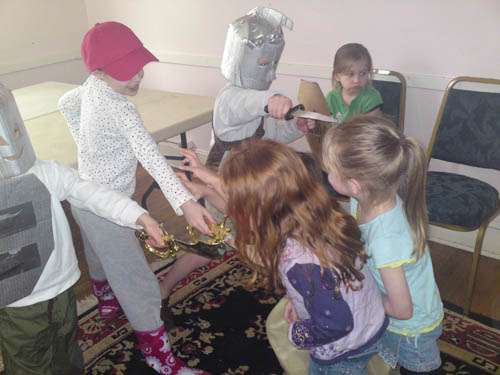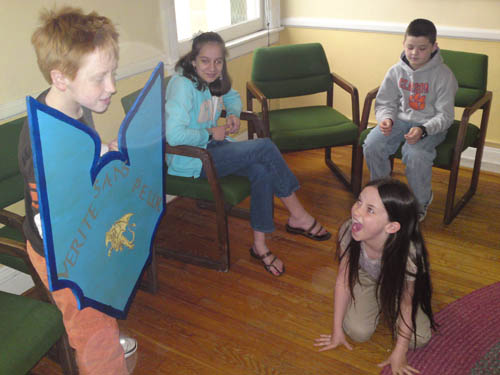 This post relates to my literature class for children at Homeschool Out of the Box co-op in Norfolk, VA. This semester we are reading The Aeneid, using Penelope Lively's book In Search of a Homeland, and other supplemental materials. For other lessons, please click the Aeneid tag at the bottom of this post.
This post relates to my literature class for children at Homeschool Out of the Box co-op in Norfolk, VA. This semester we are reading The Aeneid, using Penelope Lively's book In Search of a Homeland, and other supplemental materials. For other lessons, please click the Aeneid tag at the bottom of this post.Welcome: We had so much to do today, it was ridiculous! We took our quiz on the gladiator material and sang our songs. We added two new verses of Mark Antony's speech, and that was exciting. Next week we'll be adding the "Musa Mihi" portion of the Aeneid memorization, so we previewed that a little bit in our best Jar Jar Binks voices.
Memory Work: Last week the students got the poem "Horatio at the Bridge." Today we read it for the first time. This poem was written by Thomas Babington Macaulay, a British poet and politician during Victorian times. The Brits of this time romanticized the Romans because they too were forming an empire, taking over the world, and believed they were helping people by spreading their culture and civilization. The same values and beliefs that led the Romans to subdue and assimilate barbarians greatly appealed to the movers and shakers in the 19th century empire building nations. Here is a link to the whole poem, Horatius. We are reading and studying verses 24-33, but it would be great for the kids to read the whole thing. Next week we'll be reading it dramatically, taking parts for the Consul, and Horatio, and the other speakers.
Gladiatorial Games:
There were several key elements we adopted, to making this experience work.
1. No weapons, not even fake ones. I removed this rule in the enrichment class, because the younger children actually seemed way more capable of safely using them without incident.
2. Clear explanation of the concept of pantomime. As in... no touching.
3. Clear explanation of the concept of creating tableaux. As in... freeze.
Your job as teacheris to create and narrate a story including all the characters the children have chosen. You want to include all the important elements in the lesson. Make sure your wealthy sponsors are acknowledged. Make sure your gladiators holler at the emperor, "We who are about to die salute you!" Incorporate your wild animals, your condemned criminals, and give the crowd a chance to decide the fate of a doomed man. The kids' job is to not decapitate each other.
Here's how it works so no one gets hurt and everyone has fun: The children pause while you narrate the story, and freeze when you say "Pose!" So, you tell a little bit of the story, yell "Pose!" and then the children move into their next position and freeze. Yes, we did have some jumping on tables and there were some tense moments when a lion escaped. But there were no actual decapitations, and everyone got to play the part they wanted, including the guard who saved the emperor from an assassination plot. Here are some pictures:



For more pictures, visit the Aeneid set on my Flickr account.
Assignment: This week's fast facts sheet covers the Law of the Twelve Tables. The point of reading these is to take another look at the ways in which our ideas are the same as the Romans, and the ways they're different. We have only excerpts, but you can find a bit more about the Twelve Tables here. Some of these laws seem very reasonable to us, and some seem completely nuts. Next week we're going to talk about which laws are most important to our contemporary world, and what twelve things we'd write down if we had twelve ivory tablets to engrave, and an empire to build. Should be interesting!

No comments:
Post a Comment